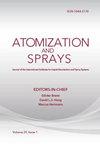Effects of evaporating spray on near-field turbulence characteristics in a gas turbine-like model combustor
IF 0.9
4区 工程技术
Q4 ENGINEERING, CHEMICAL
引用次数: 0
Abstract
Direct numerical simulation of lean fuel spray in a pre-vaporized, premixed model combustor is performed to investigate the effects of evaporating spray on turbulence characteristics under gas turbine-like conditions. The gas phase is solved in Eulerian frame and the droplets are tracked as Lagrangian particles. The evaporation process is described with a corrected infinite thermal conductivity model. The results show that evaporating spray which has almost completed evaporation in the premixing tube could significantly affect the local turbulent characteristic in the near-field area. With the existence of evaporating spray, the recirculation zones are evidently enhanced and expanded. For fluctuating fields, the increasement in axial component indicates an intensive turbulent disturbance caused by evaporating spray. Further analysis of energy spectrum shows that evaporating spray magnifies kinetic energy in the small scale. The evaporating spray globally increases the turbulent kinetic energy (TKE) along the radius. Through the budget of TKE, the detailed mechanism of TKE transport is observed. The convective transport and turbulent transport are enhanced apparently while production and viscous dissipation are abated. For the sub-viscous dissipation terms, evaporating spray can significantly depress squared dilatation thus reduces turbulence dissipation to internal energy. Evaporating spray performs to influence turbulence in many aspects.蒸发喷雾对燃气轮机样机燃烧器近场湍流特性的影响
对预蒸发、预混合模型燃烧器中的贫油喷雾进行了直接数值模拟,以研究在类似燃气轮机的条件下蒸发喷雾对湍流特性的影响。气相在欧拉框架下求解,液滴作为拉格朗日粒子进行跟踪。蒸发过程用修正的无限导热模型描述。结果表明,在预混管内基本完成蒸发的蒸发喷雾会显著影响近场区域的局部湍流特性。由于蒸发喷雾的存在,再循环区明显增强和扩大。对于波动场,轴向分量的增加表明蒸发喷雾引起了强烈的湍流扰动。对能谱的进一步分析表明,蒸发喷雾放大了小尺度的动能。蒸发喷雾在全局范围内增加了沿半径方向的湍流动能(TKE)。通过对 TKE 的预算,可以观察到 TKE 传输的详细机制。对流传输和湍流传输明显增强,而生成和粘性耗散则减弱。对于亚粘性耗散项,蒸发喷雾能显著抑制平方扩张,从而减少湍流耗散为内能。蒸发喷雾对湍流有多方面的影响。
本文章由计算机程序翻译,如有差异,请以英文原文为准。
求助全文
约1分钟内获得全文
求助全文
来源期刊

Atomization and Sprays
工程技术-材料科学:综合
CiteScore
2.10
自引率
16.70%
发文量
54
审稿时长
1.7 months
期刊介绍:
The application and utilization of sprays is not new, and in modern society, it is extensive enough that almost every industry and household uses some form of sprays. What is new is an increasing scientific interest in atomization - the need to understand the physical structure of liquids under conditions of higher shear rates and interaction with gaseous flow. This need is being met with the publication of Atomization and Sprays, an authoritative, international journal presenting high quality research, applications, and review papers.
 求助内容:
求助内容: 应助结果提醒方式:
应助结果提醒方式:


